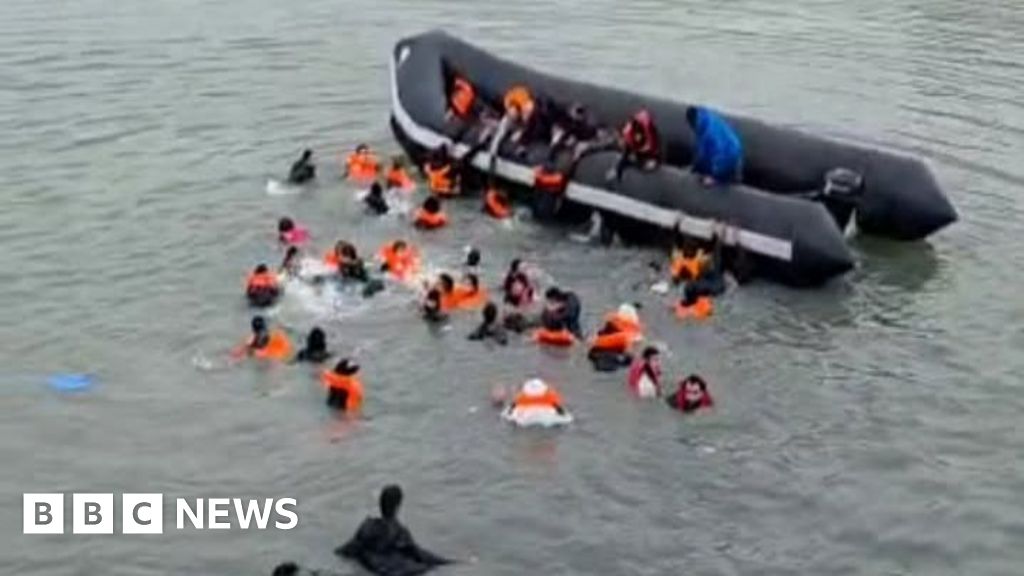Andrew HardingParis and Gravelines
France is backing away from a recent commitment to intervene more forcefully at sea to stop small boats from crossing the English Channel, according to multiple sources contacted by the BBC.
There is evidence that France’s current political turmoil is partly to blame, but it will come as a blow to the UK government’s attempts to tackle the issue.
In the meantime, dangerously overcrowded inflatable boats continue to leave the coast on an almost daily basis, from a shallow tidal canal near the port of Dunkirk.
While the man in charge of border security in the UK, Martin Hewitt, has already expressed “frustration” at French delays, the BBC has now heard from a number of sources in France that promises of a new “maritime doctrine” – which would see patrol boats attempt to intercept inflatable boats and pull them back to shore – are hollow.
“It’s just a political stunt. It’s much blah-blah,” said one figure closely linked to French maritime security.
The maritime prefecture for the Channel told the BBC that the new doctrine on taxi-boats was “still being studied”.
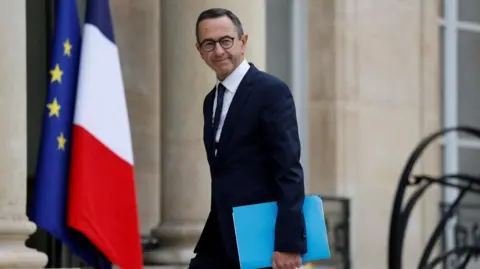 Reuters
ReutersFormer Interior Minister Bruno Retailleau was widely credited, not least in the UK, with driving a more aggressive approach in the Channel.
That culminated last July with a summit between President Emmanuel Macron and Prime Minister Sir Keir Starmer.
The focus then was on plans to intercept the so-called “taxi boats” now used by the smugglers to cruise close to the coastline, collecting passengers already standing in the water.
French police rarely intervene against the overcrowded taxi-boats since it’s considered too great a risk to both officers and civilians.
But days before the summit, we witnessed French police wading into the sea, south of Boulogne, to slash the sides of a taxi-boat as it got caught in the waves and drifted close to shore.
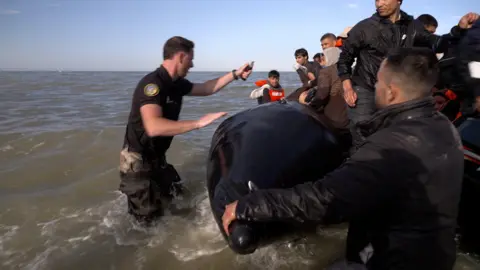
In London, the prime minister’s spokesman reacted immediately to our footage, calling it “a really significant moment” and proof that the French were already starting to take tougher action to stop the small boats on shore and, potentially, at sea.
Soon afterwards, a well-placed source in the French interior ministry told the BBC that policy changes were imminent.
“We will start interventions at sea in the very next few days, after the revision of the doctrine,” said the source.
But since then, Retailleau has lost his job as minister in the latest of several chaotic reshuffles, and a distracted French government appears to be focused on other crises.
“It’s possible that (the new measures at sea) might never happen,” said Peter Walsh, who researches the issue at Oxford’s Migration Observatory.

The migrant boats meanwhile are still leaving France, and not just from the beaches.
A retired chip shop owner who lives beside a canal just inland from the coast at Gravelines said he had seen four leave in a single day.
He showed us videos of the boats, including images of people scrambling onboard in the middle of the canal, and of a police patrol boat recently circling another inflatable while making no attempt to block it from leaving.
“It’s mad, mad, mad. You have to stop the boats,” said Jean Deldicque.
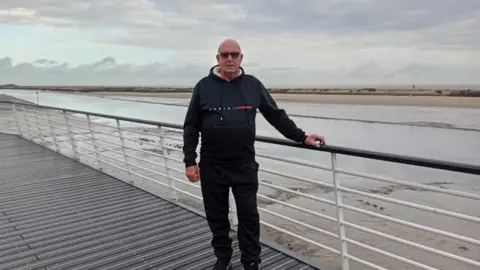
A marine expert, who asked us not to use their name due to their close ties to the state, said the Canal de L’Aa was shallow enough for security forces to intervene without putting people’s lives at serious risk.
Other canals and rivers in the area have sometimes been blocked by ropes or chains, but these have often proved ineffective against the highly adaptive smuggling gangs.
While French politics has clearly played a role in frustrating British government attempts to slow down the number of small-boat crossings, legal and moral issues are also proving crucial.
A major obstacle, cited by several sources, to stopping the inflatables at sea is the fear that it would, almost inevitably, lead to more deaths and to prosecutions of those security forces involved.
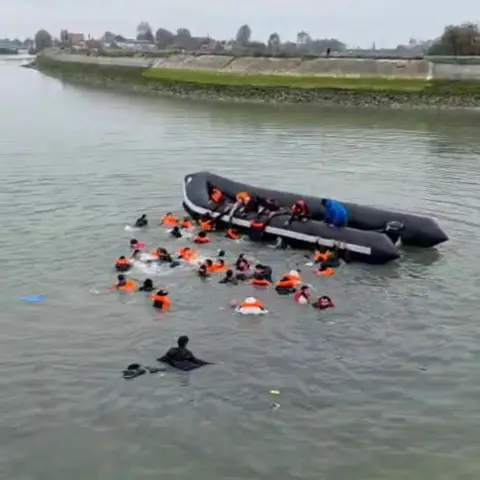 supplied
supplied“The French navy is against this. They realise this kind of mission is extremely dangerous and they risk being implicated and ending up in court. It’s going to be a disaster,” said one source.
Even the less ambitious idea, talked up by British officials, of giving the French police more legal latitude to intervene from the beaches and go deeper into the water to stop the boats has been rejected. If, indeed, it was ever truly considered.
Current rules allow French police and firefighters to intervene in shallow water only to rescue people who appear to be in imminent danger. That is clearly what we witnessed on Ecault beach near Boulogne in early July.
There has been confusion from the start about French commitment on this issue. Several French security sources have told us that getting the police to stop the boats by wading into the sea was never even a remote possibility.
But French unions have suggested that changes were considered and rejected.
Police union spokesman Jean-Pierre Cloez said the interior minister’s plans raised earlier this year were now “on hold”.
“We considered at the time it was [too] dangerous. The rules, for the moment, are the same. There’s no change in the way we do things.”
Mr Cloez and others also all mentioned an ongoing lack of equipment, training and personnel.
None of this means that France is abandoning its commitment to patrol its beaches, or to intercept the smugglers and their boats on land.
The operation is sizeable, sophisticated, and stretches along more than 150km (90 miles) of coastline.
The UK is paying for a significant share of the work under the terms of the Sandhurst Treaty, currently being renegotiated for renewal next year.
Meanwhile volunteer rescue crews working along the northern French coast continue to pull people, and sometimes bodies, out of the water.
Some volunteers have expressed frustration at being repeatedly asked by the maritime authorities to escort inflatable boats towards British waters: a process that can take many hours.
But they have also highlighted the unique challenges facing anyone seeking to intervene at in the Channel.
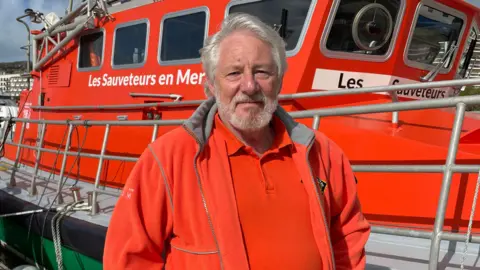
“Odd as it may seem, if they don’t request assistance, you cannot force them to accept it,” says Gérard Barron, the head of Boulogne’s sea-rescue volunteers.
“The crew has reported to me that on occasion, when they have approached a dinghy carrying too many people and asked if they want assistance, they have seen knives flashed.
“They have also, on occasion, seen young men holding infants over the water, threatening to drop them if we got any closer.”
After 45 years of experience in rescues, Barron admits to a certain exasperation with France’s current failure to do more to stop the smugglers.
If existing rules against putting to sea in flimsy, unlicensed and overcrowded boats were enforced, he thinks many lives would be saved.
A Home Office spokesperson said: “France is a critical partner in tackling illegal migration and we continue to work closely together as they review their maritime doctrine.”
Additional reporting by Paul Pradier


